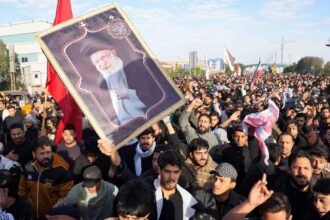Taliban and Pakistani delegations are continuing talks for the third day in Istanbul, Turkey. Although some Pakistani media reported late on Sunday that the Pakistani side had walked out, the Taliban government’s National Radio Television reported on Monday that significant agreements were reached on several issues during the second round of talks, with a few more limited topics to be resolved by the end of the day. The outcome of the talks has not been officially announced yet.
The report adds that the negotiations will continue late into the night and are expected to conclude with a joint statement on a ceasefire extension, reopening of roads, prisoner release, the time and place of the next meeting, and other issues.
The Taliban government’s spokesperson, Zabihullah Mujahid, has also stated that the talks are ongoing today and they are waiting for the outcome.
He expressed confidence in resolving issues through dialogue but warned that if anyone attacks Afghanistan, they will face a reaction.
The statement by Mujahid, released on the National Television’s X page (formerly Twitter), reads: “We believe in resolving issues through dialogue, but if, God forbid, anyone attacks Afghanistan, it’s obvious they will face a similar reaction, and Afghans have the right to defend themselves.”
The Pakistani government has not officially commented on the ongoing talks in Istanbul.
However, Reuters news agency, citing Pakistani security sources, reports that the Pakistani delegation has made it clear that there can be “no compromise” on their key demands regarding cross-border terrorism.
The report further claims that the Pakistani side has accused the Taliban of not cooperating in the talks.
However, a Taliban source denied this claim and, stating that negotiations are ongoing. Meanwhile, several Pakistani media outlets, reported, citing sources, that the Pakistani delegation presented its demands to the Afghan side late last night, emphasizing that Islamabad expects these demands to be met and believes the only solution lies in acting against militant groups operating from Afghan soil.
According to these reports, involved Pakistanis have warned that the Taliban’s current stance is not in the interest of Afghanistan, the region, or Pakistan.
Sources claim that despite hopes for progress on the second day of talks, the Taliban’s refusal to provide written guarantees has disrupted the process, and the Taliban delegation involved in the talks lacks the authority to reach an agreement.
Pakistani media also claim that the Taliban delegation proposed that Islamabad hold direct talks with the Pakistani Taliban (TTP), but the Pakistani delegation rejected this request, stating that they will not negotiate with a terrorist group and that it is the responsibility of the Taliban government in Afghanistan to eliminate the TTP.
The Taliban government has not officially commented on Pakistan’s demands. However, a Foreign Ministry source told on Sunday that Pakistan is seeking operations against the Tehreek-e-Taliban Pakistan and Baloch separatists, but the Taliban government has previously denied the presence of these armed groups in Afghanistan.
The sources added that Pakistan also wants to strengthen the process of intelligence sharing and coordination between Islamabad and Kabul.
Other demands made by the Pakistani delegation include increased monitoring on the Durand Line, immediate action against TTP centers, arresting TTP and Baloch separatist leaders, and preventing the use of Afghan territory against Pakistan.
The Taliban’s National Radio Television reported yesterday that the Taliban delegation has submitted its demands to Pakistan in writing. According to the statement, the demands focus on Pakistan’s commitment to respect Afghanistan’s territorial integrity, both on land and in the air, and not allowing any groups or opposition forces to use Pakistani territory against Afghanistan. Additionally, the Taliban has proposed establishing a four-way channel to monitor and evaluate any ceasefire violations and facilitate information exchange.
The statement mentioned that the Pakistani side has also submitted its draft to the Taliban delegation, and efforts are being made to reach a final conclusion in the presence of mediators. The first round of talks between the Taliban government and Pakistan began on October 19 in Doha, facilitated by Qatar and Turkey, resulting in a temporary ceasefire and agreement to hold a second round of talks in Istanbul.
This comes after the Taliban Defense Ministry announced on October 11 that Pakistan had violated Afghan airspace and conducted airstrikes on civilians in Paktika.
Following this, intense clashes erupted along the Durand Line, with the Taliban describing them as retaliatory attacks. Both sides claimed heavy casualties.
Dozens of civilians have been reported killed or injured in these clashes. Additionally, all border crossings along the Durand Line between the two countries have been closed for the 15th consecutive day, resulting in significant financial losses for traders.
Khalilzad: “Pakistan Defense Minister Khawaja Asif’s threat of open war with Afghanistan is reckless in the extreme.”
The threat of “open war” with Afghanistan by Pakistan’s Defense Minister Khawaja Asif has sparked a reaction from former US diplomat Zalmay Khalilzad.
Khalilzad describes Asif’s statement as “reckless in the extreme,” warning that such rhetoric could dangerously escalate tensions between Islamabad and Kabul. Asif is known for his hostility towards Afghans and Pakistan’s Pashtun population, and Khalilzad questions whether it’s wise to let personal emotions dictate national security matters.
Khawaja Asif said at a gathering in Sialkot that if issues with the Taliban government are not resolved through talks, Pakistan will initiate an “open war” with Afghanistan. The Taliban government has not commented on Asif’s remarks, but previously stated they won’t attack Pakistan unless provoked. Zalmay Khalilzad said a war between Afghanistan and Pakistan would be damaging to both sides and should be avoided.








